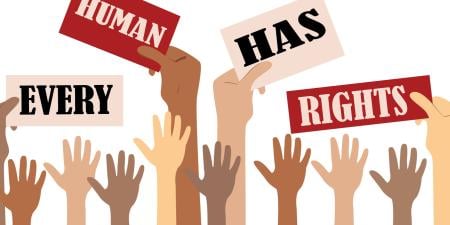As this is written, military review hearings at the US detention center at Guantánamo Bay, Cuba, are under way to determine whether any of the individual detainees has been wrongly classified as an "illegal combatant" by the Department of Defense, and is, thus, eligible for repatriation. The men facing these hearings have been held, often in solitary confinement, for up to 2½ years and have not had access to legal counsel. It appears from news reports that a majority of detainees are refusing to participate in the hearings.
On the face of it, this would seem altogether irrational. Some detainees may be released as a result of the military review hearings, so there would appear to be no downside to participating. Only a few detainees currently face charges that will result in their being tried before military commissions, so those refusing the military review hearing process may still be held indefinitely without trial. And these review hearings are not the habeas corpus proceedings mandated by the US Supreme Court in its recent decisions on the Guantánamo detentions; thus, participation in them would not preclude participation in judicial hearings later on. Still, it appears that many detainees are refusing to attend.
Are those who are refusing doing so to protest their detention and the unfairness of their legal situation and because they see the classification review hearings as sham justice? Possibly this applies to some or many. But might not other detainees be abstaining due to hopelessness, despair, demoralization, and depression—mental states that can be induced or exacerbated by incarceration of the type experienced by Guantánamo detainees?1 Individual Guantánamo detainees have asserted the presence of these conditions in recent legal pleadings.2 These mental states, and more serious aberrations rising to the level of psychosis, induced by conditions of confinement, have been widely described in the psychiatric literature since the 19th century.3
These conditions may constitute mental disorders sufficiently severe to impair or negate individuals' ability to competently waive or assist their attorneys or to participate unrepresented in the process. While these conditions are prevalent among US prisoners as well, the Guantanamo detainees' conditions, beyond the human suffering involved, may actually preclude their exercising the few legal rights they possess.
Surprisingly few mental health or medical professionals speak or write on the Guantánamo detentions or military commission process. It has fallen to others—attorneys, journalists, and human rights advocates and organizations, to bring news and warnings to the public about the psychiatric and psycho-legal impact of the detentions. Still, there is ample reason for medical and mental health professionals to join the public debate on the detentions and their mental health consequences.
While a host of professional ethical codes would support involvement in the debate over the detentions, one need go no further than the Declaration of Professional Responsibility: Medicine's Social Contract with Humanity, adopted by the AMA House of Delegates in December, 2002,4 and by a host of other professional organizations. Physicians are enjoined to "use their skills beyond the bounds of the traditional patient-physician relationship in responding to exceptional global conditions and need for care. . . .The duties the declaration imposes transcend physician roles and specialties, professional associations, geographic boundaries, and political divides."4
The declaration calls upon us to "respect the dignity of every individual" and to "refrain from supporting or committing crimes against humanity and condemn all such acts." We are also asked to "advocate for . . . political changes that ameliorate suffering and contribute to human well-being."4
The global political changes that might be made in service of these goals are limitless and many would be difficult or impossible to achieve. However, in the area of US treatment of alleged "illegal combatants," change may be possible. The Department of Defense has yielded to political pressure in many ways as it has gradually altered the military commission rules, released groups of detainees from particular nations, introduced a review hearings procedure, and opened Guantánamo itself to journalistic scrutiny.
Medical and mental health professionals are in a unique position to advocate for humane conditions of detention, fair legal processes, adequate psychiatric care, and appropriate psycho-legal evaluations. The Guantánamo detainees, exposed to a host of potential mental health risks, are hidden from professional and public scrutiny to an extent unparalleled by a correctional population in recent US history. Professional societies have avoided the controversies posed by the Guantánamo detentions; only human rights organizations have come forward to express concern about the detainees' mental health: The International Committee of the Red Cross, Amnesty International, Human Rights Watch, and Physicians for Human Rights, to name a few. Perhaps our professions are so silent because we have become accustomed to maintaining silence about the massive human rights violations so prevalent in US jails and prisons.5 However, public examination and discussion of the Guantánamo situation may also help us take a clearer look at our responsibilities at home.
References
-
Kupers TA. The 'Mental Health Crisis Behind Bars and What We Must Do About It. San Francisco, CA: Jossey-Bass; 1999.
-
Petition for writ of mandamus. Filed in the case of Swift v Rumsfeld(WD Wash 2004) [April 6, 2004].
- Grassian S. Psychopathological effects of solitary confinement. Am J Psychiatry. 1983;140(11):1450-1454.
-
American Medical Association. Declaration of Professional Responsibility. Accessed August 18, 2004.
-
Elsner A. Gates of Injustice: The Crisis in America's Prisons. Upper Saddle River, NJ: Financial Times Prentice Hall; 2004.



